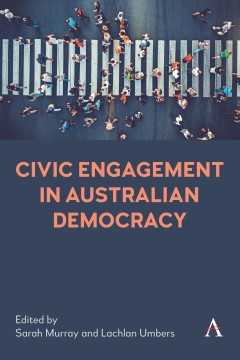Civic Engagement in Australian Democracy
Edited by Sarah Murray & Lachlan Umbers
Anthem Studies in Australian Politics, Economics and Society
Other Formats Available:
- About This Book
- Reviews
- Author Information
- Series
- Table of Contents
- Links
- Podcasts
About This Book
The Australian democratic system has long been regarded as one of the most stable and predictable in the world, with an entrenched two-party duopoly, compulsory voting ensuring high levels of electoral participation and relatively high levels of satisfaction with the democratic process. Yet the ways Australians engage with, and participate in, their democracy have shifted substantially in recent times. While a record proportion of Australians are now on the electoral roll, less than 1% belong to a political party, and the share of Australians that have always voted for the same party in Federal elections has declined from 72% in 1967 to 37% in 2022. Turnout in the 2022 Federal Election fell below 90% for the first time since the introduction of compulsory voting in 1924. Over 50% of voters cast their ballots early in 2022, up from around 10% in 2004. The advent of social media has afforded Australians a range of opportunities for political engagement but has also given rise to serious concerns surrounding the dissemination of misinformation. And Australians have also recently been afforded several historically rare opportunities for direct participation in the lawmaking process – particularly, the 2017 same-sex marriage plebiscite and the 2023 referendum on the Aboriginal and Torres Strait Islander Voice to Parliament.
These developments give rise to a wide range of deep, difficult questions for Australian democracy, many of which have been under-explored. What, for instance, does the failure of the referendum on the Aboriginal and Torres Strait Islander Voice to Parliament mean for Australian democracy? What sorts of opportunities ought to be afforded to Australians for direct participation in government? How might climate change impact Australian democracy in the coming decades? How might the rise in early voting impact the character of Australian democracy? What opportunities do Australians have for engagement in civic life, and what obstacles do they face in exercising them?
This edited collection brings together specialists in the democratic process to consider such questions, alongside many others. Moreover, the collection is uniquely interdisciplinary, insofar as the contributors are drawn from a diverse range of fields – law, philosophy, political science and sociology. The chapters each help bring us a broader understanding of civic participation in Australian democracy, in order that we might evaluate the status quo, and gauge where it might be headed, in the future.
Reviews
‘In the current global democratic winter, Australia is an outlier: its democratic system is comparatively robust. Yet the system is also in flux. This volume examines the pressing challenges to Australian de-mocracy and proposes considered solutions to steady and enhance it. The result is a timely, intriguing and important study.’ — Paul Strangio, Emeritus Professor in Politics, School of Social Sciences at Monash University, Australia
‘As we are forced to watch the backsliding of democracies around the world in real time, it is more important than ever to better understand our own. Murray and Umbers’s edited collection traces the history of civic engagement in Australian democracy and forecasts, in the wake of the marriage equal-ity plebiscite, Voice Referendum and the climate crisis, what the future may hold.’ — Dr. Blair Williams, Lecturer in Australian Politics at Monash University
Author Information
Sarah Murray is a Professor at the University of Western Australia Law School and is an expert in constitutional law and electoral law, court innovation and community justice centers.
Lachlan Umbers is Senior Lecturer and Chair of Philosophical Studies at the University of Western Australia. He works primarily in moral and political philosophy, with a particular focus upon issues in democratic theory and climate justice.
Series
Anthem Studies in Australian Politics, Economics and Society
Table of Contents
Acknowledgements; List of Contributors; 1 Introduction - Lachlan Umbers and Sarah Murray;2 Citizen Guardians? Civic Engagement and Constitutional Conventions - Nicholas Barry; Narelle Miragliotta; Sarah Murray and Zim Nwokora; 3 Compulsory Voting in an Era of Democratic Disengagement - Jill Sheppard; 4 Early Voting and the Democratic Ideal - Lachlan Umbers; 5 Merely Advisory or Effectively Binding? The Status of Plebiscite Results in Australia - Paul Kildea; 6 Reflections on the Voice Referendum - Ryan Cox; 7 Understanding the Competing Sovereignty Claims of the Voice Referendum - Ron Levy and Justin McCaul; 8 Australian Civic Engagement: A Case Study of the 2023 Voice to Parliament Referendum - Andrea Carson; Phoebe Hayman and Justin Phillips; 9 The Unstable Foundations of the Implied Freedom of Political Communication - Murray Wesson; 10 Increasing Third-Sector Governance Expectations as a Barrier to Civic Engagement in Australia - Ian Murray and Sarah Murray; 11 Civic Engagement among the Australian African Diaspora: National and Transnational Activity - Farida Fozdar; Sarah Prout Quicke; Dominic Dagbanja; David Mickler; Nothando Ngwenya; Chika Anyanwu; Janet Dzator; Karen Farquarson; Alan Gamlen and Kiros Hiruy; 12 Australian Democracy and the Climate Crisis - Joo-Cheong Tham; Index
Links
Stay Updated
Information
Latest Tweets



